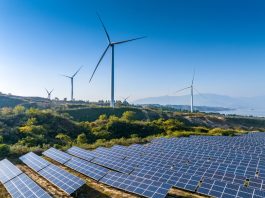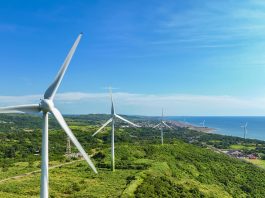EvoPhase has developed what claims to be the world’s first urban wind turbine designed by AI and tailored to the unique wind conditions of a specific geographic area in the UK city of Birmingham.
Known as the Birmingham Blade, the urban wind turbine is a collaboration between EvoPhase and Kwik Fab and addresses the issue of producing small-scale, affordable generators of wind energy.
The team worked with precision metal fabricators Kwik Fab to produce the first iteration of the Birmingham Blade and demonstrate the feasibility of manufacturing the design.
AI-driven design
EvoPhase used its AI-driven design process to generate and test designs for its efficiency at wind speeds found in Birmingham, which, at 3.6 metres/second, are substantially lower than the ten metres per second rating for most wind turbines.
“We needed a turbine that could capture Birmingham’s relatively low wind speeds while managing turbulence caused by surrounding buildings,” explained Leonard Nicusan, chief technology officer of EvoPhase.
“Using AI was essential for breaking free from the long-standing biases that have influenced wind turbine designs for the past century.”
EvoPhase found the optimal design for curved turbine blades that spun around a central point and confirmed that it would be up to seven times more efficient than existing designs used in the Birmingham area.
Nicusan said: “AI allowed us to explore design possibilities beyond the scope of traditional human experimentation.
“We were able to generate, test, and refine over 2,000 urban wind turbine designs in just a few weeks, significantly accelerating our development process and achieving what would have taken years and millions of pounds through conventional methods.”
The new urban wind turbine represents a real solution for the wind industry
Evolutionary simulations have confirmed that the urban wind turbine is up to seven times more efficient than existing designs in Birmingham’s wind speeds and urban environment.
The final design will represent a predictive solution that is ready for real-world use.
Developed by a research group led by Dr Kit Windows-Yule at the University of Birmingham, EvoPhase’s AI-led evolutionary design process mimics natural selection.
This approach reportedly allows for the simultaneous optimisation of many different parameters, avoiding traditional trade-offs between performance factors.
An aluminium version manufactured by Kwik Fab will be sited on a roof space in Birmingham for evaluation and testing, and the final product is expected to be available by late 2025.
EvoPhase’s collaboration with Kwik Fab demonstrates the broad applicability of their predictive designs. It was made possible in part by the Manchester Prize, which named the team as a finalist in the inaugural year of the prize in May 2024.
Developing more solutions for different conditions
The EvoPhase and Kwik Fab collaboration provides a rapid design and prototyping service, and the team is now working on another urban wind turbine design for very different conditions in Edinburgh.
“We can take a complex design and manufacture and ship a prototype for testing within weeks,” said Kwik Fab’s Paul Jarvis.
“We’d like to work with organisations that want to make the most of wind power, a source of sustainable energy that is free and present in every country.”









